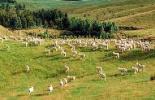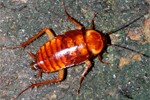
Herd of cattle in the Brazilian Amazon. Research has shown that most of the deforestation in the Amazon has led to cattle ranching. Photo by: Rhett A. Butler.
Meat consumption and production remains on the rise, according to a new report Worldwatch Institute, with large-scale environmental impacts especially linked to the spread of factory farming. According to the report, global meat production has tripled since 1970, and jumped by 20 percent since 2000 with consumption rising significantly faster than global population.
“Much of the vigorous growth in meat production is due to the rise of industrial animal agriculture, or factory farming,” Danielle Nierenberg, Worldwatch senior researcher said in a press release.
The environmental impact of meat production affects everything from land use to fossil fuel consumption.
According to a different 2010 report, a quarter of the world’s land is used for 1.7 billion livestock animals, while a third of the world’s arable land goes to growing grain for livestock feed. Meanwhile, record one billion people in the world do not have enough food says the UN. Cattle ranching had also been implicated for vast deforestation. In Brazil approximately 80 percent of deforested land in the Amazon becomes cattle pasture, imperiling global biodiversity and carbon stocks.
Livestock production is also an intensive industry consuming large amounts of water, fertilizer, pesticides, herbicides and fossil fuels—all of which contribute to global pollution and environmental degradation. The report found that 23 percent of global water used for agriculture goes to livestock. Waste from the nearly 2 billion livestock is an additional environmental issue.
Finally, the livestock industry is big player in climate change. A past report estimated that 18 percent of the world’s greenhouse gas emissions comes from raising livestock, although the number has subsequently been questioned. Still, livestock produce significant amounts of methane and nitrous oxide, both more potent greenhouse gases than carbon.
The WorldWatch Institute report argues that factory farming has by far the biggest impact on the environment, and that the livestock industry would do best to move toward organic, pasture-fed production.
“Properly managed and scaled meat production—like the kind pursued by small-scale pastoralists on dry grasslands—could actually sequester carbon dioxide. It’s largely a matter of rethinking meat at both ends of the production-consumption trail,” says Worldwatch Institute President Robert Engelman.
Wealth plays a big role in how much meat people consume. In the developing world, people consume on average (70 pounds) 32 kilograms of meat a year. In the industrial world that jumps to 176 pounds (80 kilograms) annually, nearly half a pound of meat a day.
Related articles
Got milk: 3 percent of greenhouse gases from milk production
(04/21/2010) Just less than 3 percent of the world’s greenhouse gas emissions come from the production of milk, according to a new study by the UN Food and Agricultural Organization (FAO). Covering dairy producing animals from small nomadic herds to massive industrialized dairy operations, the FAO study factors in the production, processing, and transportation of milk as well as the fertilizer, pesticides, and feed used in the dairy industry. The total rises 4 percent if using dairy animals for meat is included.
Just how bad is meat-eating for the environment?

(03/28/2010) Meat is booming. In the past thirty years, livestock production has increased threefold. In many parts of the world where incomes are expanding, meat, once a delicacy, is now eaten regularly and voraciously. But what are the environmental impacts of this ‘livestock revolution’? Two recent studies look at the global impact of the livestock industry, one alleges that its environmental impacts in relation to greenhouse gas emissions has been overestimated, while the other takes a holistic view of the industry’s environmental impact.
Meat producers should replace cattle with insects, scientists say

(01/10/2011) Scientists in the Netherlands have discovered that insects produce significantly less greenhouse gas per kilogram of meat than cattle or pigs. Their study, published in the online journal PLoS One, suggests that a move towards insect farming could result in a more sustainable – and affordable – form of meat production.







